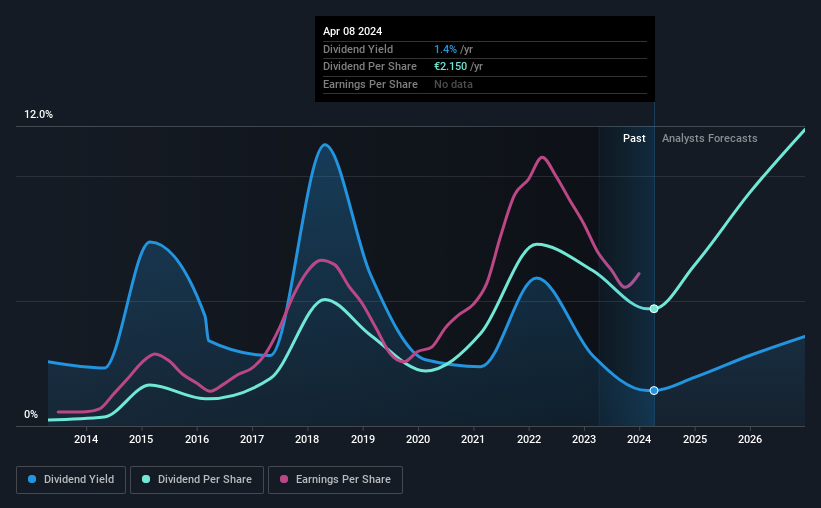BE Semiconductor Industries (AMS:BESI) Will Pay A Smaller Dividend Than Last Year
BE Semiconductor Industries N.V. (AMS:BESI) is reducing its dividend from last year's comparable payment to €2.15 on the 3rd of May. The dividend yield will be in the average range for the industry at 1.4%.
Check out our latest analysis for BE Semiconductor Industries
BE Semiconductor Industries' Dividend Is Well Covered By Earnings
We like to see a healthy dividend yield, but that is only helpful to us if the payment can continue. Prior to this announcement, BE Semiconductor Industries was paying out 94% of earnings and more than 75% of free cash flows. This indicates that the company is more focused on returning cash to shareholders than growing the business, but we don't think that there are necessarily signs that the dividend might be unsustainable.
The next year is set to see EPS grow by 196.5%. Assuming the dividend continues along the course it has been charting recently, our estimates show the payout ratio being 37% which brings it into quite a comfortable range.
Dividend Volatility
The company's dividend history has been marked by instability, with at least one cut in the last 10 years. The annual payment during the last 10 years was €0.11 in 2014, and the most recent fiscal year payment was €2.15. This works out to be a compound annual growth rate (CAGR) of approximately 35% a year over that time. BE Semiconductor Industries has grown distributions at a rapid rate despite cutting the dividend at least once in the past. Companies that cut once often cut again, so we would be cautious about buying this stock solely for the dividend income.
Dividend Growth May Be Hard To Achieve
With a relatively unstable dividend, it's even more important to see if earnings per share is growing. Earnings have grown at around 4.7% a year for the past five years, which isn't massive but still better than seeing them shrink. Earnings are not growing quickly at all, and the company is paying out most of its profit as dividends. When a company prefers to pay out cash to its shareholders instead of reinvesting it, this can often say a lot about that company's dividend prospects.
Our Thoughts On BE Semiconductor Industries' Dividend
In summary, dividends being cut isn't ideal, however it can bring the payment into a more sustainable range. The track record isn't great, and the payments are a bit high to be considered sustainable. Overall, we don't think this company has the makings of a good income stock.
Companies possessing a stable dividend policy will likely enjoy greater investor interest than those suffering from a more inconsistent approach. However, there are other things to consider for investors when analysing stock performance. To that end, BE Semiconductor Industries has 2 warning signs (and 1 which is concerning) we think you should know about. If you are a dividend investor, you might also want to look at our curated list of high yield dividend stocks.
Have feedback on this article? Concerned about the content? Get in touch with us directly. Alternatively, email editorial-team (at) simplywallst.com.
This article by Simply Wall St is general in nature. We provide commentary based on historical data and analyst forecasts only using an unbiased methodology and our articles are not intended to be financial advice. It does not constitute a recommendation to buy or sell any stock, and does not take account of your objectives, or your financial situation. We aim to bring you long-term focused analysis driven by fundamental data. Note that our analysis may not factor in the latest price-sensitive company announcements or qualitative material. Simply Wall St has no position in any stocks mentioned.

 Yahoo Finance
Yahoo Finance 
